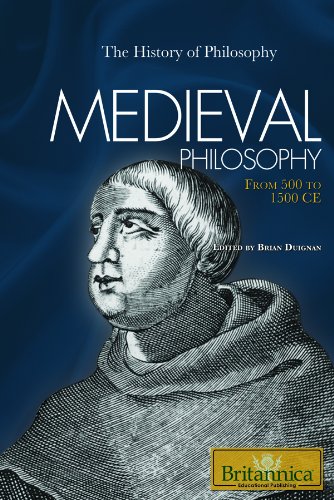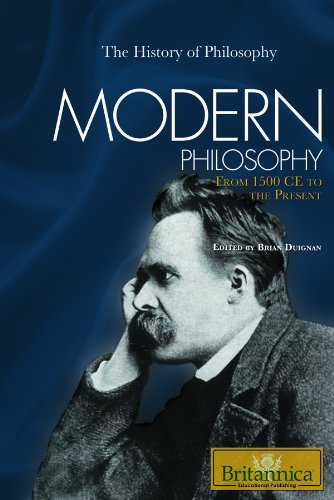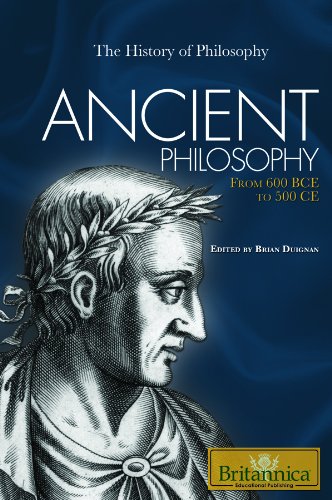-
Medieval Philosophy: From 500 to 1500 CE
Brian Duignan
Library Binding (Britannica Educational Pub, Aug. 15, 2010)Presents the history of medieval philosophy and includes profiles of notable philosophers, Jewish and Arabic medieval philsophy, and the age of the schoolmen.
-
Nietzsche: Beyond Good and Evil: Prelude to a Philosophy of the Future
Rolf-Peter Horstmann
Paperback (Cambridge University Press, Dec. 24, 2001)This is a major work by the philosopher Friedrich Nietzsche, whose writings have been deeply influential on subsequent generations of philosophers. It is offered here in a new translation by Judith Norman, with an introduction by Rolf Peter Horstmann that places the work in its historical and philosophical context.
-
Modern Philosophy: From 1500 CE to the Present
Brian Duignan
Library Binding (Britannica Educational Pub, Aug. 15, 2010)Presents the history of modern philosophy and includes profiles of notable philosophers, discussing the writings of the Renaissance, Rationalism, Enlightenment, and Empiricism.
-
Classical Philosophy: A history of philosophy without any gaps, Volume 1
Peter Adamson
Hardcover (Oxford University Press, Sept. 1, 2014)Classical Philosophy is the first of a series of books in which Peter Adamson aims ultimately to present a complete history of philosophy, more thoroughly but also more enjoyably than ever before. In short, lively chapters, based on the popular History of Philosophy podcast, he offers an accessible, humorous, and detailed look at the emergence of philosophy with the Presocratics, the probing questions of Socrates, and the first full flowering of philosophy with the dialogues of Plato and the treatises of Aristotle. The story is told "without any gaps," discussing not only such major figures but also less commonly discussed topics like the Hippocratic Corpus, the Platonic Academy, and the role of women in ancient philosophy. Within the thought of Plato and Aristotle, the reader will find in-depth introductions to major works, such as the Republic and the Nicomachean Ethics, which are treated in detail that is unusual in an introduction to ancient philosophy. Adamson looks at fascinating but less frequently read Platonic dialogues like the Charmides and Cratylus, and Aristotle's ideas in zoology and poetics. This full coverage allows him to tackle ancient discussions in all areas of philosophy, including epistemology, metaphysics, philosophy of language, philosophy of science, ethics and politics. Attention is also given to the historical and literary context of classical philosophy, with exploration of how early Greek cosmology responded to the poets Homer and Hesiod, how Socrates was presented by the comic playwright Aristophanes and the historian Xenophon, and how events in Greek history may have influenced Plato's thought. This is a new kind of history which will bring philosophy to life for all readers, including those coming to the subject for the first time.
-
Classical Philosophy: A history of philosophy without any gaps, Volume 1
Peter Adamson
Paperback (Oxford University Press, May 10, 2016)Classical Philosophy is the first of a series of books in which Peter Adamson aims ultimately to present a complete history of philosophy, more thoroughly but also more enjoyably than ever before. In short, lively chapters, based on the popular History of Philosophy podcast, he offers an accessible, humorous, and detailed look at the emergence of philosophy with the Presocratics, the probing questions of Socrates, and the first full flowering of philosophy with the dialogues of Plato and the treatises of Aristotle. The story is told "without any gaps," discussing not only such major figures but also less commonly discussed topics like the Hippocratic Corpus, the Platonic Academy, and the role of women in ancient philosophy. Within the thought of Plato and Aristotle, the reader will find in-depth introductions to major works, such as the Republic and the Nicomachean Ethics, which are treated in detail that is unusual in an introduction to ancient philosophy. Adamson looks at fascinating but less frequently read Platonic dialogues like the Charmides and Cratylus, and Aristotle's ideas in zoology and poetics. This full coverage allows him to tackle ancient discussions in all areas of philosophy, including epistemology, metaphysics, philosophy of language, philosophy of science, ethics and politics. Attention is also given to the historical and literary context of classical philosophy, with exploration of how early Greek cosmology responded to the poets Homer and Hesiod, how Socrates was presented by the comic playwright Aristophanes and the historian Xenophon, and how events in Greek history may have influenced Plato's thought. This is a new kind of history which will bring philosophy to life for all readers, including those coming to the subject for the first time.
-
Ancient Philosophy: From 600 BCE to 500 CE
Brian Duignan
Library Binding (Britannica Educational Pub, Aug. 15, 2010)Presents an introduction to philosophy in the ancient world, discussing the writings of the Pre-Socratics, Socrates, Plato, and Aristotle, as well as the teachings of Stoicism, Epicureanism, and the early Jewish and Christian authors.
-
Friedrich Waismann: The Open Texture of Analytic Philosophy
Dejan Makovec, Stewart Shapiro
Hardcover (Palgrave Macmillan, Sept. 28, 2019)This edited collection covers Friedrich Waismann's most influential contributions to twentieth-century philosophy of language: his concepts of open texture and language strata, his early criticism of verificationism and the analytic-synthetic distinction, as well as their significance for experimental and legal philosophy. In addition, Waismann's original papers in ethics, metaphysics, epistemology and the philosophy of mathematics are here evaluated. They introduce Waismann's theory of action along with his groundbreaking work on fiction, proper names and Kafka's Trial. Waismann is known as the voice of Ludwig Wittgenstein in the Vienna Circle. At the same time we find in his works a determined critic of logical positivism and ordinary language philosophy, who anticipated much later developments in the analytic tradition and devised his very own vision for its future.
-
Adam Smith: The Theory of Moral Sentiments
Knud Haakonssen
Hardcover (Cambridge University Press, Feb. 11, 2002)Adam Smith's major work of 1759 develops the foundation for a general system of morals, and is a text of central importance in the history of moral and political thought. Through the idea of sympathy and the mental construct of an impartial spectator, Smith formulated highly original theories of conscience, moral judgment and the virtues. This volume offers a new edition of the text with helpful notes for the student reader, and a substantial introduction that establishes the work in its philosophical and historical context.
-
Nietzsche: Beyond Good and Evil: Prelude to a Philosophy of the Future
Friedrich Nietzsche, Rolf-Peter Horstmann, Judith Norman
Printed Access Code (Cambridge University Press, June 5, 2012)This is a major work by the philosopher Friedrich Nietzsche, whose writings have been deeply influential on subsequent generations of philosophers. It is offered here in a new translation by Judith Norman, with an introduction by Rolf Peter Horstmann that places the work in its historical and philosophical context.
-
Adam Smith: The Theory of Moral Sentiments
Adam Smith, Knud Haakonssen
Printed Access Code (Cambridge University Press, June 5, 2012)Adam Smith's major work of 1759 develops the foundation for a general system of morals, and is a text of central importance in the history of moral and political thought. Through the idea of sympathy and the mental construct of an impartial spectator, Smith formulated highly original theories of conscience, moral judgment and the virtues. This volume offers a new edition of the text with helpful notes for the student reader, and a substantial introduction that establishes the work in its philosophical and historical context.